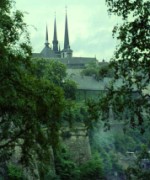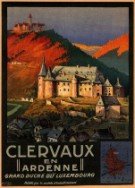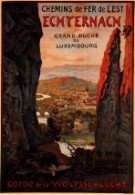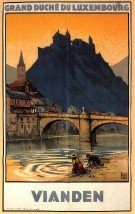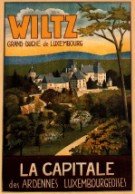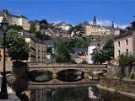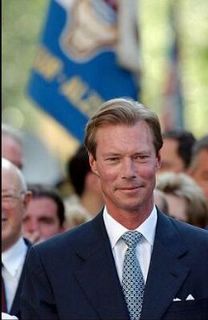
National Day of Celebration & Grand Duke's Birthday
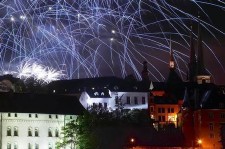
One Country, a Hundred Fifty Nationalities
One of Luxembourg's most remarkable characteristics is
its capacity for integrating different nationalities - Luxembourgish, French, German.
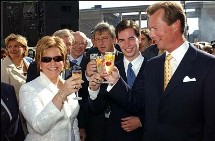
Multilingualism has been legally defined since 1984
with Lëtzebuergesch as the national language,
French as the language used for legislative
matters, while French, German and
Lëtzebuergesch all share the status
of judiciary and administrative languages.
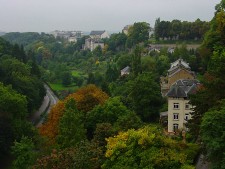
This trilingualism is a reality lived by about 290,000 native
Luxembourg people. More recently, as a side effect of the
outstanding economic growth and a policy of
social promotion, the mother tongues of some 170,000
foreign nationals now living in Luxembourg,
enrich the linguistic landscape of the Grand Duchy today.
In fact, as no language bears the status of the official language in
the Grand Duchy, French, German and Lëtzebuergesch are
omnipresent, at different degrees,
and share the roles of language in the workplace,
for publication and for communication,
be it formal or informal.
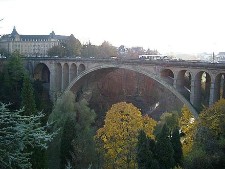
What languages for the state?
Laws are drafted in French and henceforth it is important to note
that on the judicial level only the French language text is authentic,
which is true for all levels of the public administration.
On the other hand, spoken French has progressively vanished from Parliament,
in spite of the fact that sometimes Deputies prefer French when
making important declarations.
In this official place no spoken language is clearly defined,
and politicians choose the idiom corresponding to their personal preferences.
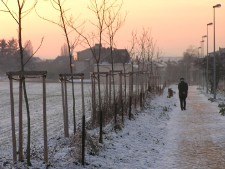
The fact is that these days regular debates in Parliament are
held in Lëtzebuergësch. The language borrows many words from French (de Congé pénal,
en Débat an der Chamber ) and from German (d’Gleichberechtigung ).Hence, accounts of public parliamentary
sessions published in the daily newspapers illustrate the mix of languages:
the debates are transcribed in
Lëtzebuergësch (which represents the highest amount of
regular written production in the vernacular),
while questions to the Government as well as
the legal texts are usually in French.

In order not to lose sight of the bigger picture,
it is important to note that the law of February 1984 states
that in administrative and judicial matters, "use may be
made of French, German or Lëtzebuergësch".
Citizens enjoy the right to choose a language when they
make an administrative application, yet the Administration
is not strictly bound to respect their preference.
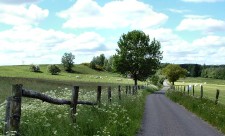
Generally speaking, the weak presence of German at the national level of
public life is counterbalanced by its strong presence at the
local level, both spoken and written
(publications from local councils). The manner in which the
Luxembourg State is administered is based on a
clear balance, preferring French in written texts and Lëtzebuergësch as the spoken language
(in the workplace and for communication purposes).
This situation has however become standard practice at the
highest level: in 1996, for the first time in the history of Luxembourg,
Prime minister Jean-Claude Juncker
delivered the annual "state of the nation address" in Lëtzebuergesch.
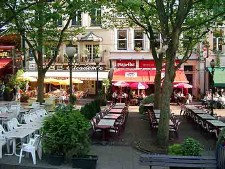
What languages for school?
Since the beginning of the waves of mass immigration, compulsory
schooling has started at the age of four, while before children
were sent to school at the age of five.
This initiative, which was mainly launched in order to expose immigrant children to
the Luxembourg language as early
as possible, was supplemented by the implementation of
a scheme offering preschool education
to children from the age of three.
Depending on the composition of the class, teachers speak German,
sometimes Lëtzebuergesch or French.
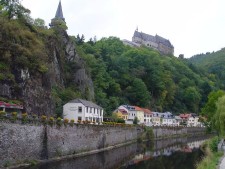
While preschool education and during the two years of
compulsory playschool, teachers use Lëtzebuergësch, in so far as possible,
when speaking to their young pupils.
The principal concern is to develop all the children’s linguistic abilities,
particularly those of foreign pupils,
for whom school often provides the first contact with the Luxembourg language.
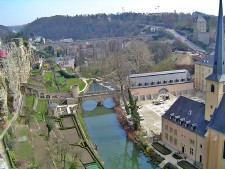
Primary school introduces the other two languages.
At the age of six children learn to read and write in German,
considered to be the written version of Lëtzebuergesch.
The following year they start learning French.
The lingua franca of primary school education is German.
However, depending on the composition of the class
(the number of children from immigrant families),
teachers speak German, sometimes Lëtzebuergesch or French.
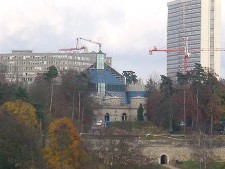
In 1991, local schools began a programme offering some classes in
Portuguese and Italian, studied two hours a week.
Since then, these courses, run in parallel to the official curriculum,
have been replaced by integrated mother-tongue courses at the primary school level.
They give children the opportunity to develop their native
language by maintaining contact with their own culture.
Subjects appearing in the official curriculum are taught in Italian
or Portuguese during two lessons a week.
During the first years of secondary education, most classes are
taught in German. Then the lingua franca for all subjects other
than language courses becomes French
in grammar schools, while German prevails in comprehensive schools.

The recent University of Luxembourg, created by the law of
12 August 2003, replacing a certain number of
post-secondary education schemes, like the Centre Universitaire,
also operates along the lines of multilingualism:
among the university’s fundamental principles
figures the "multilingual character of its teaching".
Numerous Luxembourg students continue to go
to universities abroad, be it in German-, French- or English-speaking countries:
theoretically no linguistic border can stop them.
Last but not least, the foreign schools in Luxembourg
- French, British, international - account for 7% of pupils.
In these private schools, where high tuition fees reserve entry
to the wealthier classes of the population, French and English are
the dominant languages, even though German
and Lëtzebuergesch courses are mostly on offer as well.
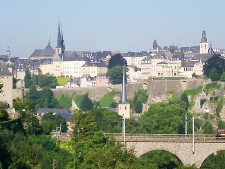
In daily life, language is multi-coloured.
Everybody chooses different linguistic paths in their daily lives.
For a Luxembourg person to be spending an entire day
speaking just one language would be a first!
Similarly, among foreigners, all generations considered,
how many of them could survive on their mother tongue alone?
In the land of mixed marriages,
the following figures provide some of the answers:
17% of residents speak more than one language with their children,
53% speak more than one language with their friends,
56% speak more than one language in their workplace.
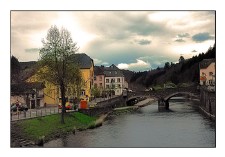
There is no doubting the fact that everybody chooses different
linguistic paths in their daily lives. Today, linguistic variation
blends together and is superimposed: people speak more
and more languages in more and more varied places.
The juxtaposed bilingualism of times past has been
replaced by a superimposed multilingualism:
now the same people juggle with different languages
according to place, time and circumstance.
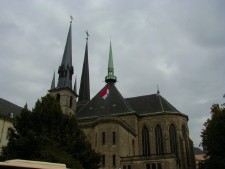
Regional differences also come into play as well.
From a statistical point of view, Lëtzebuergësch is used
45% of the time in the Capital, 54% in the remainder of the central
part of the country and 68% in the north.
Farmers use Lëtzebuergësch without exception as their
working language, the figure amounting to 75%
among teachers. For workers without any
professional training, French dominates, with 46%.
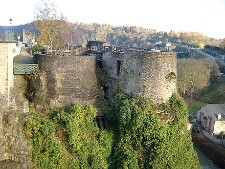
Coming across English in an evening dress is no surprise when
you consider the sizable international community in the capital
enjoying the nightlife. Whether they are from Iceland, the United States,
Scandinavia, Asia or from Slavic countries,
English is the preferred language in all their relationships.
The larger immigrant groups - Italian, Spanish, Portuguese -
become apparent by the considerable number of meeting places
which exist in Luxembourg (associations and clubs, bars, restaurants, etc.),
as well as by the use of their respective mother tongues in
their different workplaces (especially in the building sector,
the hotel business and the cleaning sector).
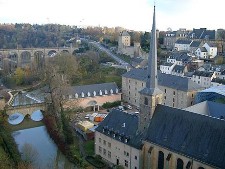
As far as French is concerned, it puts on an unusual face.
It is not exactly the French language from France because the
influences of Belgian Walloon are rather strong.
But examples of that influence are extremely subtle.
When Luxembourg people have to speak in French,
they are very conscious of grammatical rules, a remnant of strict teaching in school.
They speak a careful and formal kind of French, sometimes too correct,
which runs wild only when penned by poets and authors,
or when spoken by younger generations.
The Grand Duchy of Luxembourg is slightly smaller than Rhode Island
at 999 square miles. But do not let its tiny capital city of 82,000 people
fool you.
With 189 banks, three official languages
and 50% of its population foreign born,
Luxembourg City is an international dynamo.

The Grand-Duchy of Luxembourg occupies a very special position
among the Member States of the European Union.
One of its most remarkable characteristics is certainly its
astonishing capacity for integrating different nationalities.
The demographic evolution Luxembourg knew during the last century
is exceptional. From 200.000 in 1900, the population
passed to 451.600 people today,
which corresponds to an increase of more than 100%.
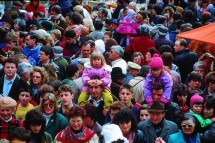
Nearly 39% of this population is of foreign origin. This percentage,
which corresponds to a figure of 174.200 foreign residents,
exceeds even 50% in the capital of the Grand Duchy.
At first, it was mostly the steel industry and the construction sector
which attracted a great deal of Italian and Portuguese immigrants.
Nowadays the immigration is mainly French, Belgian or British.
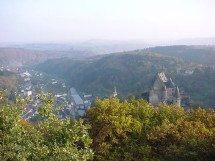
According to the last figures, more than 150 different nationalities create
the demographic richness of the Grand Duchy:
a community of ethnic groups that is remarkable.
Of these numerous communities, the ones present since several generations
are Portuguese, French, Italian, Belgian and German.
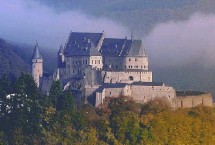
Amongst the methods by which Luxembourg managed
the integration of such a high percentage of people from diverse origins,
mixed marriages seem very important.
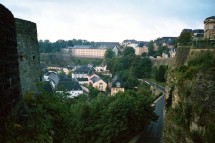
One couple out of four is thus mixed and 30% of the people in possession
of a Luxembourgian passport have at least one direct ascendant of foreign origin.
Obviously, the demographic situation of the Grand Duchy is
reflected on the national work-market. The foreign workers constitute
thus more than 60% of the working population.
This percentage results from the immigration rate on one side
and is reinforced by workers from abroad.
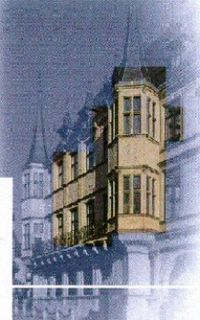
As a matter of fact, during the seventies, the explosion of
the financial market in conjunction with acute unemployment in the
bordering areas resulted in a daily immigration of people
living near the border of the Grand-Duchy.
Whereas these people represented only 30.000 workers in 1990,
one counts currently more than 100.000 on a total of
approximately 275.000 employees in Luxembourg.
This working population constitutes more than 38% of
all the wage-earners of the Grand Duchy and even 52% in the capital.
The majority of them (53%) live in France, 27,3% in Belgium and 19,7% in Germany.
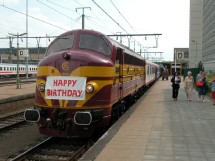
These figures make of Luxembourg an astonishing country where,
in spite of a strong proportion of people from foreign origin,
one knows nearly no intercultural tensions.

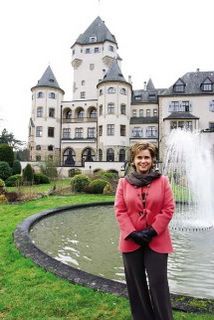
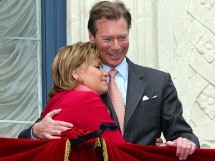
Grand Duke and Duchess of Luxembourg
Besides Luxemburgish, the Grand Duke speaks French, English and German.
He attended secondary school first in Luxembourg,
and later in France where he passed the baccalaureate (1974).
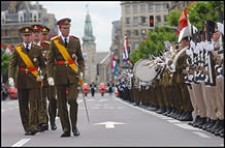
In 1975, Prince Henri successfully obtained a Staff College Certificate at
the Royal Military Academy of Sandhurst (UK).
He then studied economics and political science at the University of Geneva
where He graduated in 1980 with an Honours degree (Licence ès sciences politiques).

His Royal Highness has been conferred an Honorary Degree of
Doctor of Humane Letters of Sacred Heart University, Fairfield,
Connecticut, (USA) as well as an Honorary Degree of Doctor of Law of
Miami University, Oxford, Ohio (USA). He is also an Honorary Doctor of
Economics of Khon Kaen University, (Thailand) and Doctor rer. pol. h.c.
of the University of Trier (Germany).
While continuing His higher education His studies took Him to other countries,
both in Europe and overseas. In 1978 and in 1979 He visited the United States
as a trainee in order to gain practical experience and to complete His studies.
As Honorary Chairman of the "Board of Economic Development",
set up in 1977, Prince Henri has visited numerous countries all over the
world to promote the Grand Duchy as a center for industrial investment.

He was Member of the "State Council" (Conseil d'Etat) from
1980 to 1998 and in connection with this nomination.
He became familiar with the legislative branch of Luxembourg's
Parliamentary system. Since the Nagano Session of February 1998.
He has been a member of the International Olympic Committee.

He is also President of the Organizing Committee (Comité de Patronage) of
the International Trade Fairs of Luxembourg and Chairman of the
above-mentioned Board of Economic Development.
His Royal Highness is an active member of the Mentor Foundation which
was recently created under the patronage of the World Health Organisation.
The aim of the Foundation is to prevent substance abuse among young people.

On the 4th of March 1998, He was appointed according to
article 42 of the Constitution "Lieutenant-Representative" by
His father, the Grand Duke.
The Grand Duke is very much concerned about nature and its preservation
as well in Luxembourg as abroad. He is Chairman of the
Galapagos Darwin Trust Luxembourg and member of the
Charles Darwin Foundation for the Galapagos Islands.
He spends most of His leisure time reading or listening to
classical music. His favourite sports are skiing, swimming,
water-skiing, sailing, tennis and hunting.

The 7th of October 2000, H.R.H. the Royal highness Henri became
Grand Duke of Luxembourg, succeeding to his father, the Grand Duke Jean.
reference ....
*BBC News:Luxembourg's new Grand Duke
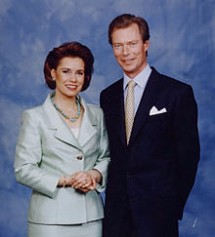
Grand Duchess Maria Teresa was born in Havana, Cuba, on 22 March 1956,
to José Antonio Mestre and Maria Teresa Batista-Falla de Mestre
In October 1959, at the time of the revolution, Maria Teresa Mestre left
Cuba with her parents. The family settled in New York where, as a young girl,
she was a pupil at Marymount School.
From 1961 she carried on her studies at the Lycée Français.
In June 1965 her parents settled down for a few months on their family
estate of Santander in Spain, before taking up permanent residence in Geneva.
Maria Teresa Mestre first carried on her studies at the Institut Marie-José at
Gstaad, then at the boarding school Marie-Thérèse in Geneva,
where she successfully passed the French General Certificate of Education
(baccalauréat) in June 1975.
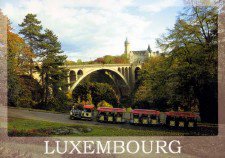
In 1980 she graduated at the University of Geneva in political sciences.
Miss Mestre met Prince Henri at this University. For four years they both
carried on similar studies, working sometimes in the same study groups
to which Miss Mestre reported on numerous occasions;
she was for instance the author of a report on the compared
legislations within the EEC, on woman's work and on motherhood.
During the same period Maria Teresa Mestre took an ever increasing interest
in social and human problems, following the family tradition which had brought
her grand-parents to devote themselves actively to
philantropical and cultural tasks in Cuba.
Besides her studies, Miss Mestre was in Geneva a member
of a group taking care of the residents of old people's homes.
She also taught children in a Geneva classroom.

Spanish being her mother tongue, Grand Duchess Maria Teresa knows French
thoroughly for having carried on her studies at the French School (Lycée Français) and
in Switzerland. In her prime youth she learned English.
After her marriage she learned Luxembourgish and
she speaks also German and Italian.

In her childhood, Maria Teresa Mestre took ballet and
singing tuition courses. She loves music and literature and is interested in
painting. Devoted to sport, she practices skiing, ice-skating and water sports.
She has two brothers and one sis.
Since 1997, the Grand Duchess acts as a Good-Will Ambassador of UNESCO
and supports in this respect specifically organisations which are
active in the field of micro-credits and child protection.
The Grand Duchess is showing a strong interest in the social situation
in her country, dedicating her efforts mainly to the children and families in danger,
to the social integration of persons who are physically,
mentally or socially handicapped and to gender related issues.

She has granted her patronage and active support notably to the
Luxembourg League of Blind People, the National Nurses' Association
and the Alzheimer Association of Luxembourg.
She is furthermore chairing the Foundation Prince Henri-Princess Maria Teresa
for the handicapped and occupying the Honorary Chair
of the Foundation for Research on Aids.
She is member of the Council of Trustees of the Mentor Foundation (London)
which is concentrating on the prevention of substance abuse
among children and young people and which is maintaining
a special relationship with World Health Organisation.
In October 1999, HRH Crown Princess Maria Teresa
is named Docteur Honoris Causa to the Seton Hall University,
School for diplomatics and international relations in the USA.
Luxembourg History
Luxembourg's history reads a bit like
the storybook background its landscape suggests.
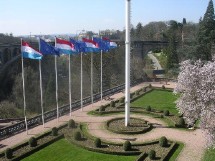
Though the area's occupation actually extends back further than the Roman era,
present-day Luxembourg stems from the loins of Count Sigefroid of Ardennes,
who raised a castle here in 963 AD and sowed the seeds of a
dynasty that's spawned rulers throughout Europe.
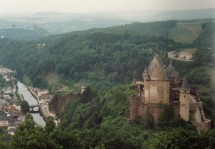
By the end of the Middle Ages, Sigefroid's city had the Burgundians,
Spanish, French, Austrians and Prussians all waging bloody battles to conquer and secure it.
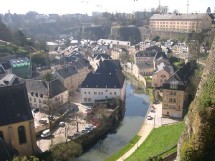
Besieged, destroyed and rebuilt more than 20 times in 400 years,
it grew to become the strongest fortress in Europe, after Gibraltar.
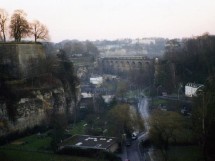
Listed as a French 'forestry department' during Napoleon's reign,
Luxembourg was included in the newly formed United Kingdom of the
Netherlands, along with Belgium, in 1814.
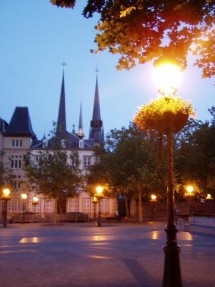
It fragmented 16 years later, when Belgium broke
off from the Netherlands, taking half of Luxembourg along for the ride.
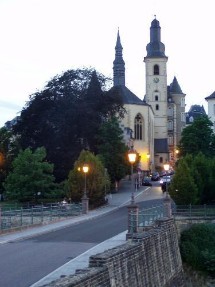
This division heated up the Grand Duchy's desire
for independence, and in 1830 the Dutch portion became present-day Luxembourg.
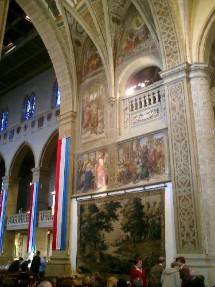
The 1867 Treaty of London reaffirmed this autonomy.
Soon after, the country declared itself neutral in international
affairs and - an appropriate symbol of its nascent neutrality
- torched its much contested fort.

The discovery of iron ore around 1850 ushered Luxembourg
into the 20th century and pushed the country to the frontline of
European economic influence. (Steel exports continue to make up
roughly a quarter of the country's export trade.)
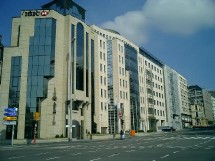
When the industry slumped in the mid-1970s, the Grand Duchy
reacted quickly by wooing big spenders from abroad with
favorable banking and taxation laws.
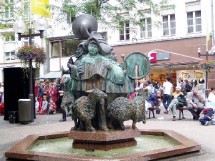
In 1948, after Nazi occupation during WWII, Luxembourg gave up
its position of neutrality to join in various economic,
political and military organizations, including NATO and the United Nations.
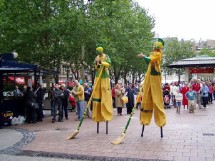
The formation of Benelux - an economic union between Belgium,
the Netherlands and Luxembourg - was among the more prominent
of these groupings. It also served as a model for today's European Union,
of which Luxembourg was a founding member.
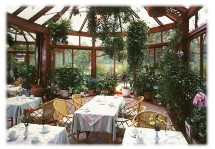
Places like Luxembourg have long been noted for significantly
lower prices on a host of items, including gas, tobacco, coffee, tea and alcohol.
Many far-Western Germans fill their tanks in the Grand Duchy
during the week as well as on Sunday,
when a car wash is nowhere to be found in the Federal Republic.
With Green party-inspired taxation causing German
petrol prices to soar, Luxembourg offers
pleasant diversions and Sunday shopping.

Other Luxembourg facts ....
Luxembourg is the sixth-smallest country and the only
Grand Duchy in the world. The country measures just
51 miles (max North-South) by 32 miles (max East-West),
and has a population of 450 000 comprising the highest proportion
of inhabitants with a foreign passport among the EU countries.

Political Overview
The Grand Duchy of Luxembourg is an hereditary
constitutional monarchy ruled until recently by
head of state Grand Duke Jean of Luxembourg.
On 7 October 2000 Grand Duke Jean abdicated in favour of his son
Prince Henri of Luxembourg, now titled the Grand Duke Henri of
Luxembourg. Legislative power is exercised by the unicameral
Chamber of Deputies (Chambre des Députés) with 60 members
elected by universal adult suffrage for five year terms
under a Party-list proportional representation system.
Some legislative functions are also entrusted to the advisory
State Council, with 21 members appointed for life by the
Grand Duke, although decisions made by this body
can be overruled by the legislature. Executive power is
vested in the Grand Duke, but is normally exercised by
the Council of Ministers, led by the head of the government
(Prime Minister). The Grand Duke appoints ministers,
but they are responsible to the legislature.

Although Luxembourg is divided into 12 counties for
administrative purposes, it is subdivided differently during
general elections and for the purpose of local government.
During elections, Luxembourg is subdivided into four
electoral districts or constituencies: Center, East, North
and South. In relation to local government, the Grand Duchy is
subdivided into three administrative districts:
Diekirch, Grevenmacher and Luxembourg. District Commissioners
serve as intermediaries between the central Government and the 118 municipalities.

Major Parties
The main political parties are the Christian Social Party
(CSV - Christian Democrats), and the Democratic Party (PDL - Liberals).
Other political parties include the Socialist Workers' Party (LSAP),
Five-Sixths Pensioners' Action Committee (since 1992, the ADR)
the Green Party, the Ecology Party and the Communist Party.
The CSV has consistently been the largest party
and has provided the Prime Minister for 64 out of the last 69 years.

Political Developments/Current Issues
The political situation has been remarkably stable,
dominated by the centre-right
CSV with strong associations with the Catholic Church.
The CSV has been in government either in its own right or
in coalition since 1919, except for the period 1974-1979.
The 13 June 2004 elections saw the demise of the
Christian Democrat/Liberal government which was elected in
1999 and the renewal of the Christian Democrat/Socialist alliance
between the CSV and the LSAP. A new Christian
Democrat/Socialist government has been formed by a
coalition between the Christian Social Party
(the Christian Democrats) and the Socialist Worker's
Party (LSAP). Mr Jean-Claude Juncker (CSV) has retained
his position as Prime Minister and also holds portfolios as
Minister for State and Minister of Finance.
The CSV also retains its position as the senior partner in the
coalition government. Mr Jean Asselborn (LSAP) is the new
Deputy Prime Minister, Minister for Foreign Affairs and Immigration.

Economic Developments
Luxembourg has a stable economy featuring low inflation
and low unemployment rates, although economic growth slumped
between 2000 and 2001 from 8.9 per cent to just 1.2 per cent.
Financial services is the dominant sector in the economy,
offsetting a steady decline in Luxembourg's steel industry.
More than 30 per cent of Luxembourg's labour force comes
from outside its own borders. Luxembourg's nearest neighbours
of Germany, France and Belgium account for 66 per cent of its
imports and are the destination for 55 per cent of Luxembourg's exports.
Foreign Relations
Luxembourg is one of six founding members of the
European Union and tends to favour closer integration within the EU.
Luxembourg is also a signatory of the Brussels Treaty
providing for collective self defence between its members,
a NATO member and favours the further development of the
EU's security role. Luxembourg held the Presidency of the
EU from July to December 1997 and the Presidency of the
Council of Europe from May to November 2002.
Luxembourg will again hold the Presidency
of the EU from January – June 2005
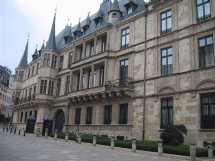
Residential Palace
Luxembourg plays host to several European institutions
including the Secretariat-general of the European Parliament,
the European Court of Justice and the European Investment Bank.
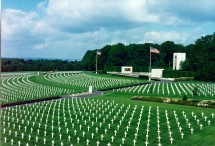
American Cemetery War Dead
--------------------------------------------------------------------------------------
Photos: Luxembourg Top Secret
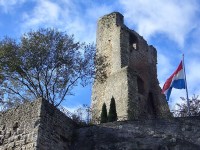

Luxembourg:The Millionaires' Paradise
Luxembourg Facts (Top Secret) Not In the Tourist Guides
There are countries which are more significant than their
size would suggest. In Europe one of them is Luxembourg
without any doubt. The smallest state in the European Union
and one of its 6 founders, the Grand Duchy means much more
than green rolling hills, medieval castles and quiet life.
For the close neighbors this country is an inexhaustible source of cheap gas.
For all the others, especially for those who count their funds by millions,
Luxembourg may be the best place for their money.
Benefiting from special treatment for non-residents and
foreign companies as well as from the relatively lower taxes,
many foreigners prefer to invest at least some of their assets in this paradise.
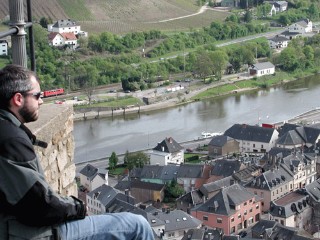
Luxembourg City Looking Into the Valley
Luxembourg was founded more than 1,000 years ago
with a population of predominantly German origin.
Famous for its strong fortifications and being at the crossroad
between the France and German states, this region was invaded tens
of times during the Middle Ages as well as in the modern times.
In the last 100 years it was twice smashed under the
German military machine. So it isn't surprising that in Luxembourg
people prefer to call their own dialect of the German language "Luxembourgish".
The authorities also prefer to assert the presence of the French language.
In the official lingo there is almost no place for the German.
On the other hand, it's widely spoken among the general
population, influenced by the myriad of German TV
cable channels. People who already have moved to
Luxembourg suggest the newcomers to try to learn
Luxembourgish to show their respect for the local people.
In fact a third of the working force in the country is born
elsewhere, mainly in France, Belgium or Germany so you
may not have to practice your Luxembourgish
very often outside official correspondence.
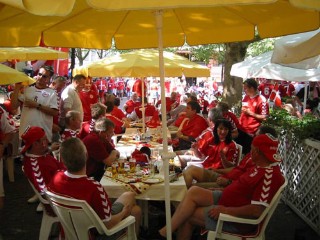
Luxembourg City Danish (Viking Invasion Day)
Luxumbourg is a paradise for tourists. You can easily see
most of the landscape in almost no time. You can also do it in
almost every season because the weather in Luxembourg
varies within a relatively small corridor. Even if prices are higher
than in neighboring countries, some tourist facilities
could be found even for budget-concious tourists.
(Year 2002 Data)
For those who wish to move permanently to Luxembourg they
should be aware of the prices that are among the highest in Europe.
Not so big old apartments of 800 sq.
feet are priced at $200-250,000 and up.
The new construction is even more expensive.
The resale houses of 1,500 sq.feet begin at $250-300,000
and the newly built at $500,000. These prices should be adjusted
to include the cost of property registration (6%) and the
additional transcript tax (1%). The municipal property
tax varies between 0.7 and 1.0% per year.

(Year 2002 Data)
For those for whom renting is an option, small apartments can
hardly be found below $1,000 per month. As for the houses,
their rents start at $2,500. The conclusion could easily be drawn;
Luxembourg is fine for those who are invited to some
executive positions or for those for whom the tax savings are
the main concern. For the rest of the public
Luxembourg will remain just another pleasant tourist destination.
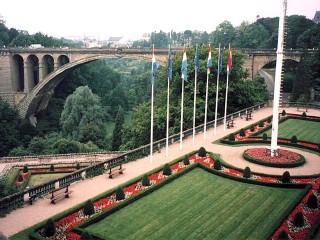
Bridge View
Country profile:Area: 2,586 sq. km Population:
448,569 (July 2002 est.) Population growth rate: 1.25% (2002 est.)
Net migration rate: 9.26 migrant(s)/1,000 population (2002 est.)
Life expectancy at birth: 77.48 years
Languages:
Luxembourgish
German
French
GDP per capita: $44,000 (2002 est.)Now $54,000 (2004)
Main trade partners: Germany, France, Belgium, US.
Internet users: 100,000 (2001)
Source: CIA - The World Factbook 2002)
Not the USA
Luxembourgers love their dogs. Dogs are welcome in
restaurants, bars, shopping malls, anywhere people congregate.
They are well trained and accepted everywhere without question.
African, French, German, English, Luxembourgisch,
Danish, Dutch, Italian, Chinese, Portuguese, even Mexican
and Spanish are spoken here openly. Nobody gives it a second
thought, or feels insulted if you speak a foreign tongue.
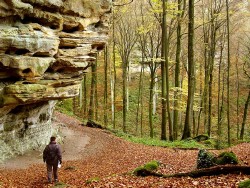
LuxembourgCountryside
Every school kid speaks their language and two others.
The city center is lined with wide and narrow cobbled streets.
Every corner a new discovery of fashion, crafts, jewelry,
glassware, stoneware, collectibles, most from local craftsmen.
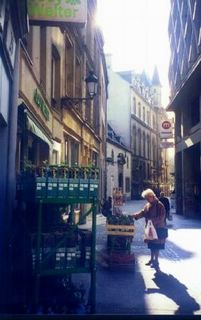
Luxembourg City Walkway
Even American rock and blues bands stop by regularly.
Festivals and circuses are numerous. Six weeks paid vacations here are
the norm. Credit cards at 3% are standard. Here people live
the good life, and are warm and friendly.
Blue Jeans is the dress code here, and even though
Luxembourg city is packed with banks and bankers,
suits and ties and formal dress is seldom observed here.
Yes, Luxembourg is proof what Europe should be and could be.
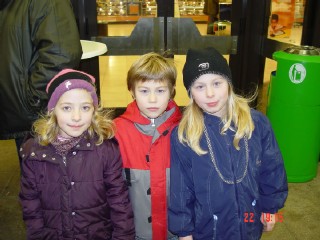
local residents
In the city center square, a music stage faces the
surrounding restaurants. Blues, Jazz, Brass bands, rock, mayan
and inca music, brasilian and eastern europe music
and dancers, even American military marches, entertain.
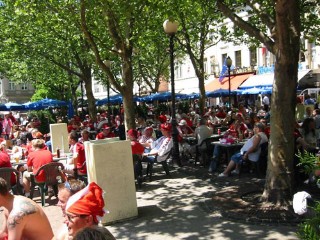
Luxembourg City Downtown Square
In spring and summer the atmosphere is a sea of sun umbrellas,
an open air market, not only fast foods but specialty
restaurants offering many ethnic dishes unknown in America.
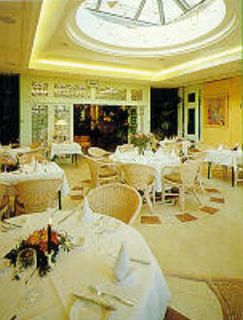
Lobster, Steak,French specialties
Gourmet restaurants and ice cream parlors abound.
British, and Irish, and even student pubs and bars are numerous.
The best kept secret in the world Luxembourgs own
"Bofferding" beer (not for export) is gulped down greedily.
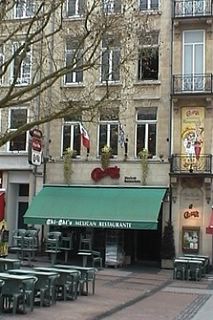
Mexican Restaurant
In the city the custom here is to buy fresh daily.
The smell of fresh baked bread and roasting pecans fill the air.
Specialty pastries of every sort are in full display.
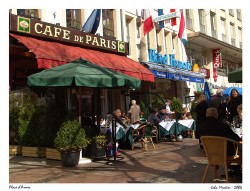
French-German Restaurant
Huge shopping malls are just outside the city.
Excellent public transportation is everywhere.
Buses arrive every ten minutes, trains are nearby.
Here people love to walk, but Harley Davidson
and Kawasaki motorcycles are popular.

Brats Grilling In the Open Air
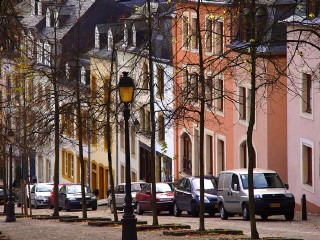
Luxembourg City Suburban View
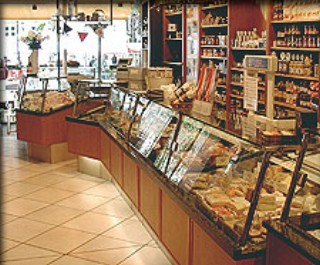
Fresh Goods Daily
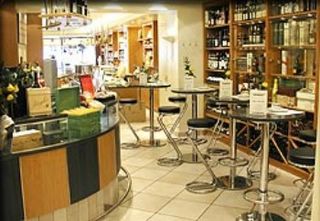
Cheese & Wine Specialty Restaurants
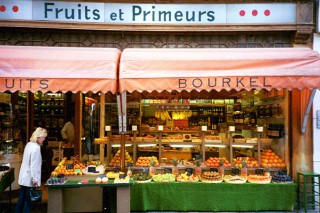
Fresh Fruit Stands Everywhere
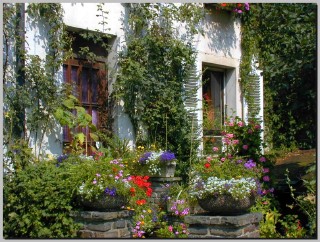
Luxembourg Home Garden
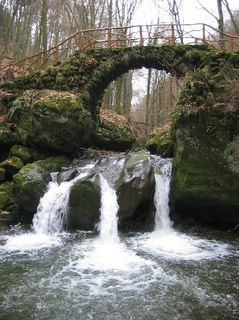
Luxembourg Countryside
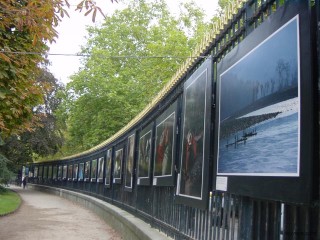
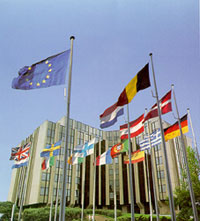
European Courts In Session In Luxembourg
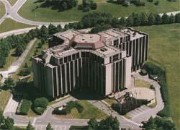
Luxembourg Court of Auditors
The mission of the European Court of Auditors is to
audit independently the collection and spending
of European Union funds and, through this, to assess
the way that the European institutions discharge these functions.
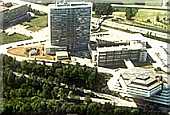
Luxembourg European Parliament
The European Parliament is committed to
enhancing public awareness and participation
in the democratic process on all levels and
in all areas of the European Union. This commitment
results in a responsibility to contribute to an
increased interface with national parliaments.
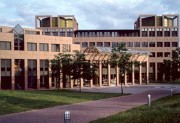
Luxembourg Court of Justice
The court interprets EU treaties and legislation.
Although it may attempt to reconcile differences
between national and EU laws, ultimately its
decisions overrule those of national courts;
they have tended to expand the EU's domain.
Increased litigation over the years led to the establishment
(1988) of a lower court, the Court of First Instances;
appeals to the Court of Justice are tightly restricted.
reference ...
*THE EUROPEAN INSTITUTIONS
Luxembourg Sports
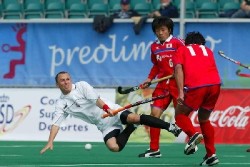
*Hockey Club Luxembourg
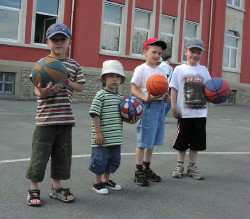
Luxembourg Professional Basketball
*EuroBasketball Luxembourg
*Luxembourg Youth Basketball

Luxembourg Model Car Racing
*Luxembourg Model Car Racing
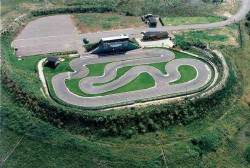
Luxembourg Model Car Racing Track
*Luxembourg Virtual Racing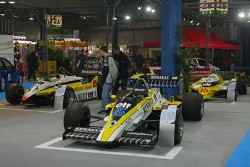
*Goodyear Tire Luxembourg Racing Gallery

Luxembourg Ice Hockey
*Luxembourg Skating
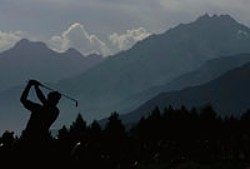
Europe PGA Tour
*Europe PGA Tour

World Tennis Tour
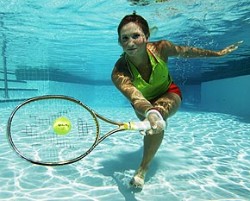
Tennis Under the Water
*Underwater Tennis
*WTA World Tennis Association Tour

*2005 Dodge Tour de Georgia set to rock
Luxembourg Other Sites ....
*Luxembourg National Military Museum
*Luxembourg Carriage Museum
reference ....
*Luxembourg Country Brief
---------------------------------------------------------------------------------------
Luxembourg Online:What's Up?
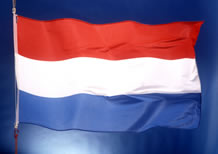
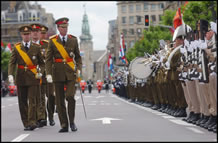
*Luxembourg Online/English
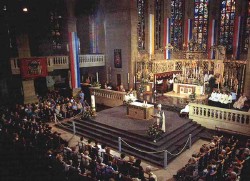
*Luxembourg News Online/English
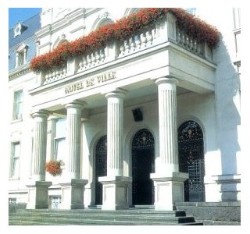
*Luxembourg Events/English
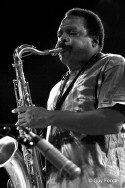

*Grand Duchy of Luxembourg
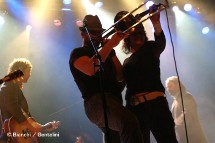
Luxembourg Sport & Leisure
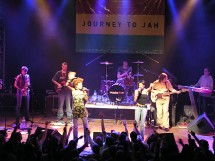
*Luxembourg Attractions
*Luxembourg Facts for the Traveler
---------------------------------------------------------------------------------
Luxembourg Classic Cars
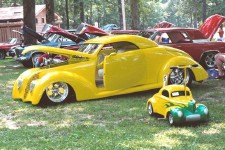
American EuroYank's 1939
Souped Up Ford Roadster Classic
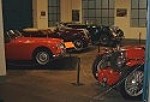
Luxembourg Classic Car Club Links
*Classic Lux Cars 4 Sale
*Luxembourg Global Cars
*Luxembourg Classic Auto Art
Random Luxembourg ....
Luxembourg In the City

Luxembourg City White House Version
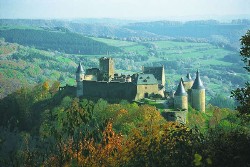
Luxembourg Countryside
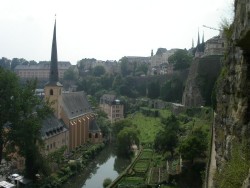
Luxembourg City Valley View
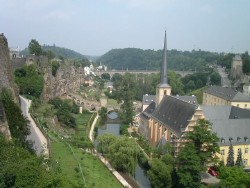
Luxembourg City Valley View
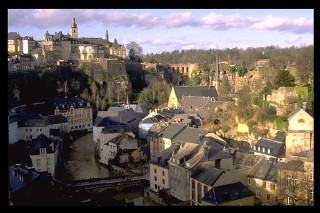
Luxembourg City Valley View
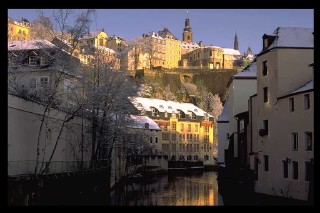
Luxembourg City Valley View

Luxembourg City View
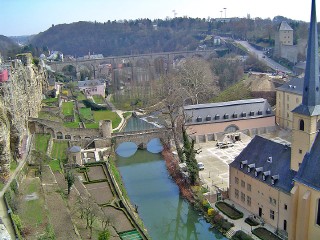
Luxembourg City Valley View
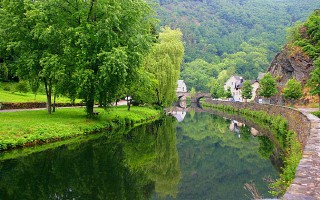
Luxembourg City Valley View
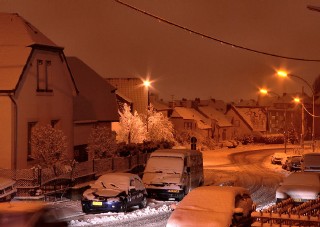
Luxembourg City Winter View
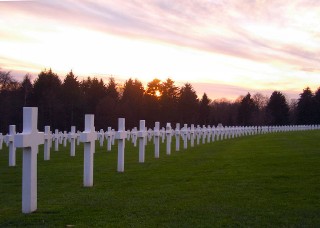
American War Dead Luxembourg
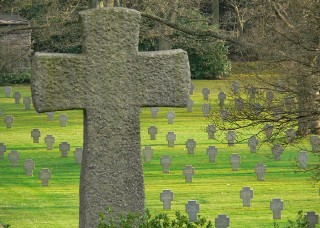
German War Dead Luxembourg

Luxembourg City Valley View
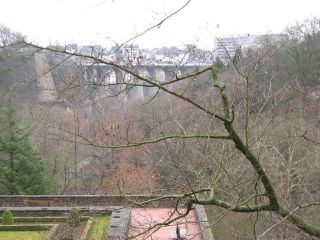
Luxembourg City Valley View
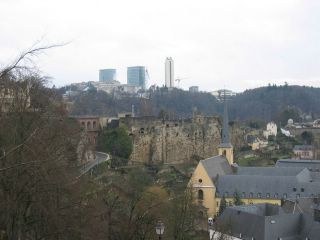
Luxembourg City Valley Upward View
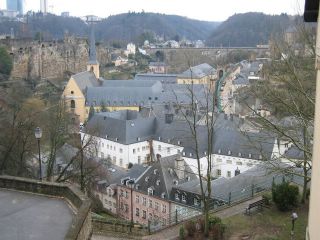
Luxembourg City Below In the Valley

Luxembourg City 150 Year Old Main Bridge
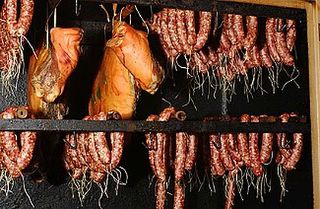
Luxembourg Favorite Smoked Meats
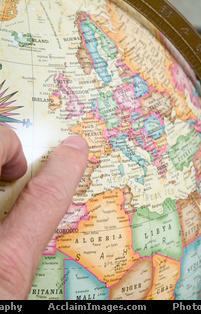
Luxembourg East of France West of Germany Somewhere
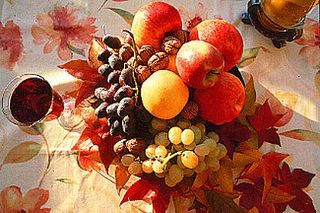
Luxembourg Local Harvest
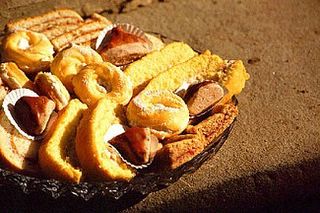
Luxembourg Standard Desserts
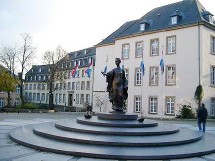
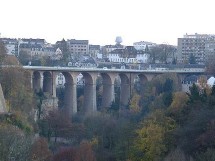
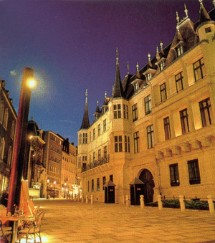
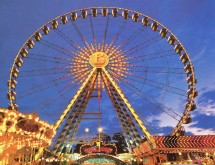
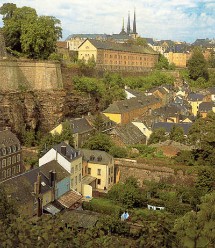
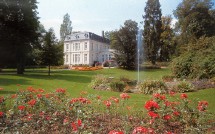
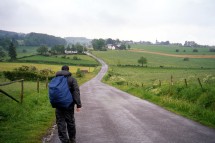
So with backpack heading out
into the Luxembourg countryside.
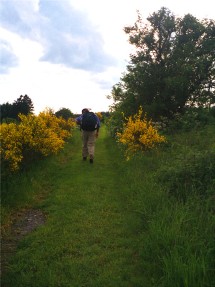
Heading up a Nature trail
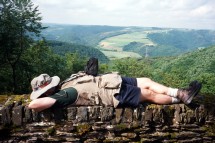
Taking a snooze along the way
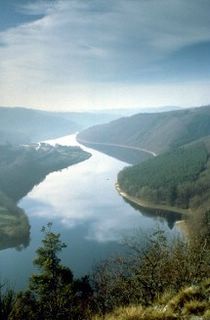
Beautiful river views
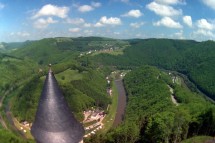
Up on a castle tower overlooking a valley
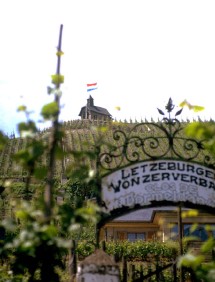
Luxembourg wine growing region
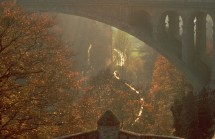
Walking under a bridge looking out
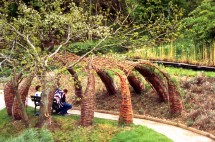
Good place to stop and reflect
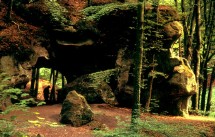
Many interesting rock formations
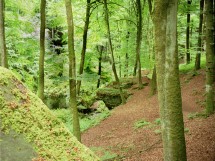
Luxembourg into the woods

Some of the many local creeks
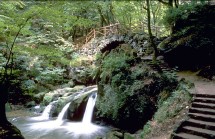
Shade, water, woods, moss hanging everywhere.
Smell of nature in full display
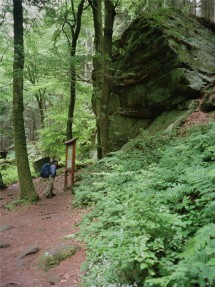
Getting directions along the way
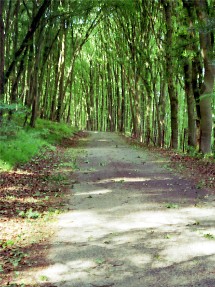
A bike path through the woods

Luxembourg city limits
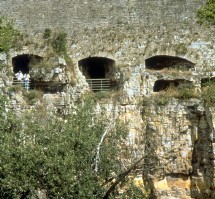
A wall of Fortress Luxembourg.
Ramparts built into the mountain.
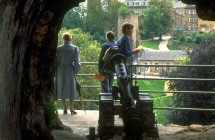
Inside looking out, cannon in background
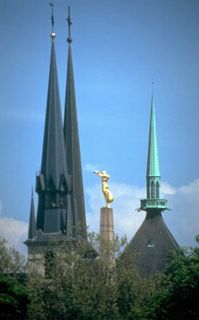
Luxembourg's Notre Dame Cathedral with the Golden Lady
(protector of Luxembourg)
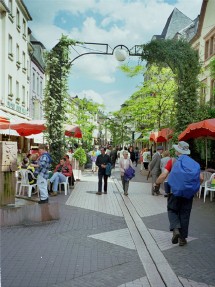
Entering a city walkway
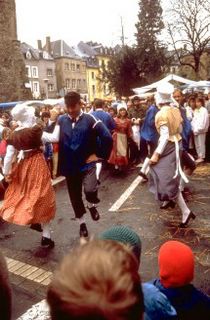
A local festival in the streets

Approaching the cafe and
restaurant center of Luxembourg city

Restaurant stop; smoked ham, wine, trimmings
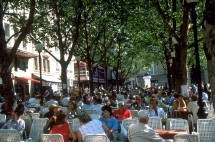
Luxembourg city square in the shade;
cocktails, beer, ice cream and chat.

Laying back in the city square.
Band stage in the background playing:
blues, jazz, brass,modern and you name it in the background till dusk.
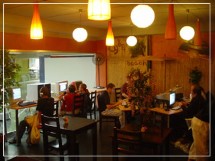
An Internet Cafe hangout
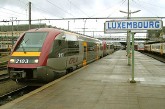
Luxembourg train station; a bullet express arriving from Paris,
Berlin, Rome, Madrid, or London, or anywhere.
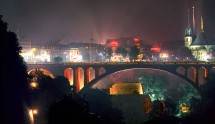
Luxembourg city at night. End of a perfect day.
Thinking about the night life.














